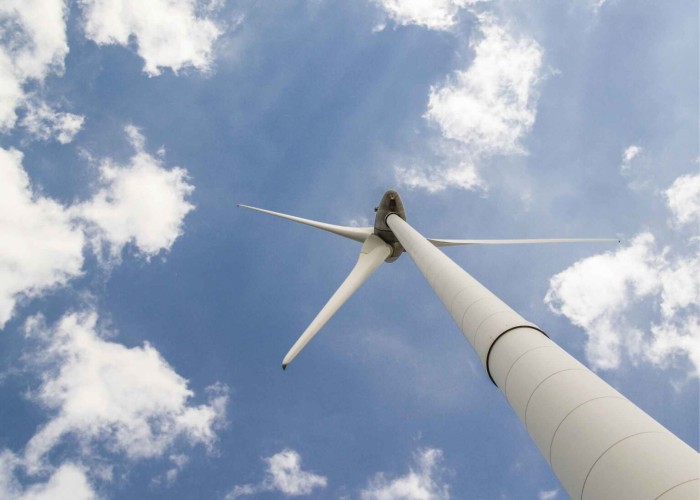Moratoriums Hurt Communities More Than They Help
 | Molly Vagle, Communications Associate, Siting |

 | Molly Vagle, Communications Associate, Siting |
Renewable energy projects, like wind and solar farms, provide many community and economic benefits in rural areas. These benefits include new employment opportunities, new and increased local spending infused into the local economy, increased local economic output, new tax revenue streams to rural communities, direct payments to landowners through land lease payments, and increased county and government services. That is why rural communities should be open to renewable energy development opportunities -- they help ensure rural America stays rural, yet open for economic prosperity.
Denying or banning renewable energy projects through restrictive zoning ordinances or moratoriums causes communities to lose out on many revitalizing and essential community and economic benefits. The truth is, moratoriums on renewable energy projects hurt rural communities more than they help. Here's why.
Economic Benefits
Utility-scale renewable energy projects are almost exclusively located in rural areas where economic development opportunities are hard to come by. Yet, they offer numerous economic benefits that ripple through the entire community. Renewable energy projects create job opportunities in the local area during the construction and operation (25-30 years) of a project. Due to the increased number of jobs, economic activity also increases because people have money to spend. Renewable energy projects also increase the property tax base of the county they are in, creating new revenue streams for local government services, such as police and fire services, local schools, roads, and community areas like parks.
In order for utility-scale renewable energy projects to operate, they need to be sited on suitable land. Willing landowners are compensated with land-lease payments in exchange for allowing a wind turbine or solar array to be sited on their property for a defined period of time. Average cropland rents were around $148/acre in 2022, while solar lease payments ranged from $600-$715/acre, offering a significant amount of income for landowners who opt to lease their land for non-permanent renewable energy development. Additionally, farming and tenant payments are still possible on the farmland while hosting renewable energy projects, as they only require a portion of the land and farming can resume near the projects.
According to American Clean Power (ACP), the renewable energy industry in Michigan employs over 11,400 Michiganders with family-supporting jobs. Michigan has seen over $8 billion of capital investments from wind, solar, and energy storage projects, and the industry has invested $61.3 million annually into local communities through property, state, and local taxes. The increased local tax base has enabled communities to invest in local government services, fire protection, parks, public roads, health, and safety services, which benefit the entire area. Additionally, farmers, ranchers, and other private landowners who choose to lease their land to renewable energy developers in Michigan have received extra income of $46.7 million in drought-proof lease payments. Renewable energy delivers a bright and reliable future for families, farmers, and business owners in Michigan and across the country.
Community Benefits
Subscribe to our newsletter for the latest on energy & our work
According to the Strategic Economic Research report "Economic Impact Analysis of Coldwater Solar Project," the Coldwater Solar Project in Branch County, Michigan will add around 683 jobs. The solar project will also add $38.1 million in new local earnings and associated economic development for Michigan from those well-paid jobs. The combined increase in earnings, land-lease payments and property taxes paid, are estimated to bring around $64 million to the state. And, the solar project is expected to pay over $21 million in property taxes over the 30-year lifetime of the project. Branch County alone is expected to receive over $367,843 from the Solar Project's property tax payments in 2023, with a lifetime total of $4.1 million. As for local government services, local 911 services are expected to receive $28,925 annually, and the Intermediate School District should receive over $7.1 million.
Gratiot County, Michigan, is another success story. From 2012-2016, Gratiot County has received over $30 million in tax revenue from wind farms, including $14.85 million to local schools.
“Wind development has unquestionably brought increased economic prosperity to Gratiot County. The area economy also benefits from increased consumer spending at restaurants and retail shops by temporary construction workers and permanent maintenance technicians, in addition to increased spending from local landowners who receive lease payments.
said Greater Gratiot Development President Jim Wheeler
Property taxes paid by renewable energy projects in Gratiot County, Michigan have increased tax revenue by $70.9 million since 2012.
Further, tax payments from wind farms in Gratiot County have totaled $71 million to local governmental units. A great example of wind farms helping communities more than they hurt, is that the wind tax fund helped sustain Gratiot County's "Meals on Wheels" program for seniors and has expanded several county parks. Local fire services in Gratiot County have been able to upgrade their equipment yearly with state-of-the-art equipment.
“With wind funding we've been able to buy a lot of stuff for the [fire] department. We've had issues in the past where old units wouldn't start up, they weren't reliable. For the last 5-7 years since the wind farms, we've just been upgrading yearly with new equipment.
said Gratiot County Fire Chief Jeff Westall,
Property Rights & Agriculture Preservation
There are clear and measurable economic benefits that renewable energy projects bring to host communities. When deciding to accept or reject a renewable energy project proposal, communities must weigh these benefits and consider the property rights of landowners as well. Efforts to ban renewable energy development not only prohibits the great economic benefits they bring to communities, but they infringe upon the rights of landowners who want to diversify their incomes by leasing their land to harvest the wind or sun. For some, revenue from wind or solar projects can make the difference between keeping the farm or having to sell all or part of it. Once land is sold for housing or other commercial purposes, it will permanently change the landscape and land use.
When wind developers proposed wind farms in Lenawee County, Michigan, for example, they were met with hostility and were eventually denied permission to develop in the area. The developers moved their project to Gratiot County where they were welcomed into the community. Don Schurr from Greater Gratiot Development spoke about the benefits of wind and called it a great tool for the community, "We did view that the wind farm development was an ag[riculture] preservation opportunity and tool, and that's exactly what it's proven to be."
Meanwhile, Lenawee County's schools need upgrades, fire departments need new equipment, and local government services are declining, but they do not have the funding to fix any of these issues.
“We lost out because it [wind farm] went from here to there [Gratiot County], and they [Gratiot County] had tremendous amount of money to do whatever they want in terms of infrastructure, fire trucks, anything they needed.
said Deborah Comstock, Editor and Publisher at The Lenawee Voice in Lenawee County
Clean Energy Keeps Rural Areas Rural and Delivers Tangible Benefits for All
Overall, tax payments from renewable energy projects have helped rural communities fill their coffers with revenue to keep essential services and make needed upgrades while not increasing taxes for residents. "They [wind farms] just sit there and provide a benefit and quality of life for everyone else," said Kevin Beeson, Supervisor of Pine River Township in Gratiot County, Michigan. Renewable energy projects are a tool to preserve the rural way of life while bringing in the needed cash flow. "Even the farmers who decided not to get into the wind agreement have come back and said that maybe they should have," said Doug Merchant Assessor of Pine River, Arcada, and Bethany Townships in Gratiot County.
“They [wind farms] have brought in a large sum of money to the county.
Watch the video below to see the impacts when communities embrace renewable energy in Michigan: